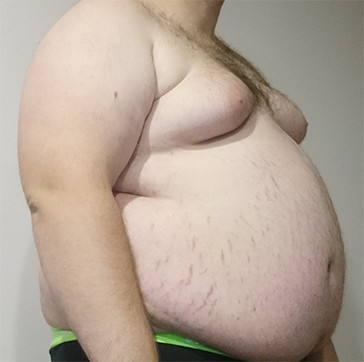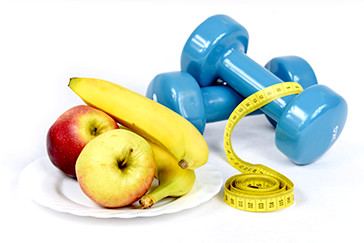Why are we getting fatter? Can we change our lifestyle?
Category: Health Tips

Almost 70% of Americans are overweight to obese. Every year in the United States, about 300,000 adults die from causes related to excess body weight. Being overweight increases the risk of developing a number of serious medical conditions. It impacts your quality of life.
There are some serious consequences of weight gain like high blood cholesterol, high blood pressure, Type II diabetes, heart disease, arthritis, gallbladder disease, sleep apnea and respiratory problems; and endometrial, breast, prostate and colon cancers. Higher body weights are also associated with increases in all-cause mortality.
What causes overweight and obesity?
Your body convert the food you eat into energy. Every action you take requires energy. Energy is needed to move, to exercise, to play, do chores, to walk and talk, even to think. The energy contained in food is measured in kilocalories, often described simply as “calories”. So when we take in more calories than we use up during our daily activities, the excess calories are stored in our bodies as fat. If you use up, or “burn” all the calories that you eat, your weight stays the same.

So being overweight might be taking in more food energy or calories than you use up in the course of your daily lives.
A review published in the Journal of Obesity estimated that at best only 20% of participants maintain weight loss at one year, and the percentage of those maintaining weight loss decreases further by the two year follow up.
Dieting don’t produce sustainable results. Your goal is to have a healthier lifestyle and make behavioral changes that will allow you to stick to your new lifestyle goals.
Sometimes it takes a health scare to make you take better care of your health. It starts in your head and knowing that you are ready for that step. So regardless what your family, partner, relatives tell you, even though they have your interest at heart, until you decide that you are ready nothing will happen.
The Fat Facts – Why are we getting fatter?
Our caloric intake is much more than what we expend. Many of us have jobs that requires us to sit at desks. Some of us eat at our desks. I am guilty of eating at my desk, however after I am done I always go for a brisk walk. The portion size has increased tremendously over the years. The foods available to us are 80% processed, with fats, artificial sweeteners, colorings, and preservatives. Fruits and vegetables are grown with chemicals and pesticides, source of protein are injected with antibiotics and growth hormones.

Everything out there is not for everyone. People want different things, so they will be different things, tricks and tips that people will use to help them achieve their weight loss goals.
What about diet foods? Are these foods making us fat?
 These diets don’t offer long-term success. Some of them can actually be dangerous to your health. These foods come with some of the weight loss programs and tend to make us fat because of the pesticides that are used for growth and the meat that are grown with antibiotics and growth hormones, plus there are added ingredients for taste and shelf life.
These diets don’t offer long-term success. Some of them can actually be dangerous to your health. These foods come with some of the weight loss programs and tend to make us fat because of the pesticides that are used for growth and the meat that are grown with antibiotics and growth hormones, plus there are added ingredients for taste and shelf life.
How can I recognize fad diets?
A fad diet is a weight loss plan or aid that promises dramatic results. As a general rule, steer clear of diets or diet products that do any of the following:
- Claim to help you lose weight very quickly (more than 1 or 2 pounds per week). Remember, it took time for you to gain unwanted weight and it will take time to lose it.
- Promise that you can lose weight and keep it off without giving up “fatty” foods or exercising on a regular basis. If a diet plan or product sounds too good to be true, it probably is.
- Limit your food choices and don’t encourage you to get balanced nutrition by eating a variety of foods.
- Require you to spend a lot of money on things like seminars, pills or prepackaged meals in order for the plan to work
Reading food labels
The number of servings in a particular food item and the serving size. For each serving, the nutrients in one serving both in terms of grams and as a percentage of the recommended daily value.
The recommended daily amount for each nutrient for two calorie levels.
- If you eat a 2,000 calorie diet, you should be eating less than 65 grams of fat and less than 20 grams of saturated fat.
- If you eat 2,500 calories a day, you should eat less than 80 grams of fat and 25 grams of saturated fat.
Learn to read the labels closely. Foods, which are, labeled fat free, are often sugar enriched. If the item, you are purchasing is peach when you look on the label that should be the first ingredient listed. Always look at other ingredients listed on the container.
What’s a Carb?
The energy contained in food and the amount of energy your body uses to perform various activities is commonly referred to as calories. Calories are often mistaken to be some fat developing constituent in food. Actually, calories are just a basic scientific measurement of energy.
 Its energy in the foods we eat and the activities we perform. Calories in a gram of food vary depending on whether the food is protein, fat or carbohydrate. Fats have 9 calories per gram, where proteins and carbohydrates have 4 calories per gram. Alcohol has 7 calories per gram. Calories are not fattening until the number we take in exceeds the number we use.
Its energy in the foods we eat and the activities we perform. Calories in a gram of food vary depending on whether the food is protein, fat or carbohydrate. Fats have 9 calories per gram, where proteins and carbohydrates have 4 calories per gram. Alcohol has 7 calories per gram. Calories are not fattening until the number we take in exceeds the number we use.
Some healthy tips to help you manage and maintain your weight:
- Reading food labels
- Shopping in the perimeter of grocery store or supermarket
- Eat breakfast, do not skip
- Eat your biggest meal of the day at lunchtime
- Begin meals with a low-fat salad, soup or fresh vegetables
- Make smoothies with fruits and vegetables (this is my favorite for myself and hubbie)
- Eat 4-5 vegetable servings every day in the raw state as much as possible
- Drink fewer sweetened beverages (such as soda, juices and sports drinks)-at most one per day
- Replace sweetened beverages with water, skim milk, and non-caffeinated tea
- Know what one serving looks like and stick to it
- Listen to your body—eat when you are hungry and stop when you are full
- Eat slowly so your body has time to let you know when you are full
- Be more active—take the stairs, park far away from stores, classrooms and walk there, walk or take your bike whenever you can
- Get support from family and friends
Summary
In order for body weight to remain unchanged, energy input (food) must be equal to energy output (activity). Any excess or unused energy is stored as adipose (fat) tissue. In other words, if you gain weight you eat more than you burn.

Everything you do requires energy or calories. We use calories to sleep, breathe, think, digest our food, etc. The amount of energy each person uses for these things will vary depending on size, gender, and metabolism.
Most people cannot sustain severe restrictions and they can lead to inadequate nutrition. Also severe restrictions, e.g. skipping meals, can decrease metabolism and decrease a person’s baseline daily calorie requirement.
It’s about identifying your behaviors that have contributed to taking in more calories than your body uses. It is also about making a specific plan to change those behaviors.



Facebook Comments